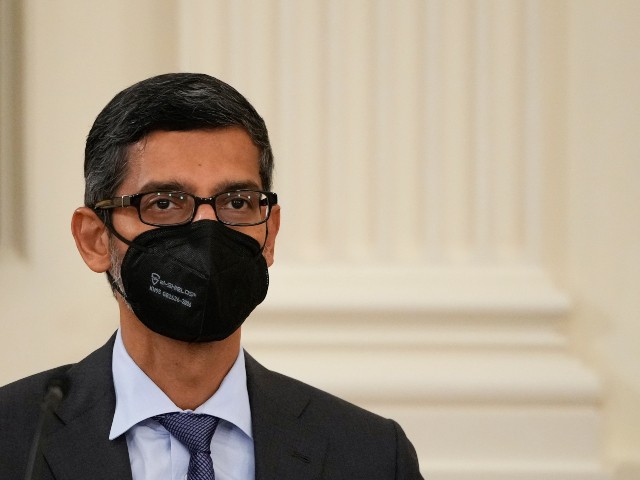Shares of Alphabet, Google’s parent company, suffered a $100 billion decline in market value after the company’s new AI chatbot provided inaccurate information in a promotional video.
Reuters reports that this week, Alphabet, the parent company of Google, saw a $100 billion decline in market value as a result of Bard, the company’s new chatbot, providing inaccurate information in a promotional video. Because of this failure and the lack of information regarding Bard’s integration into Google’s primary search function, there are worries that Google is falling behind its competitor Microsoft. The stock fell as much as 9 percent during Wednesday trading.
The launch of Google’s new chatbot on Monday was anticipated to simplify complex subjects. But just before its livestreamed presentation on Wednesday, Reuters called attention to a mistake in the company’s promotional video — the supposedly all-knowing AI made a basic mistake about space exploration.
As Reuters reported:
In the advertisement, Bard is given the prompt: “What new discoveries from the James Webb Space Telescope (JWST) can I tell my 9-year old about?” Bard responds with a number of answers, including one suggesting the JWST was used to take the very first pictures of a planet outside the Earth’s solar system, or exoplanets. The first pictures of exoplanets were, however, taken by the European Southern Observatory’s Very Large Telescope (VLT) in 2004, as confirmed by NASA.
The presentation also failed to include information on how and when Bard would be incorporated into Google’s search function. Microsoft, meanwhile, held an event on Tuesday to highlight its Bing search incorporating ChatGPT features.
Bard is an experimental conversational AI service, powered by LaMDA. Built using our large language models and drawing on information from the web, it’s a launchpad for curiosity and can help simplify complex topics → https://t.co/fSp531xKy3 pic.twitter.com/JecHXVmt8l
— Google (@Google) February 6, 2023
Google’s failure calls into question its ability to compete with its rivals, especially Microsoft, which recently invested $10 billion in ChatGPT developer OpenAI.
Senior software analyst at D.A. Davidson, Gil Luria, stated, “While Google has been a leader in AI innovation over the last several years, they seemed to have fallen asleep on implementing this technology into their search product. Google has been scrambling over the last few weeks to catch up on Search and that caused the announcement yesterday (Tuesday) to be rushed and the embarrassing mess up of posting a wrong answer during their demo.”
The recent setback for Alphabet comes after a challenging fourth quarter in which advertisers reduced spending. To speed up its efforts and keep up with OpenAI and its competitors, the search and advertising giant is reportedly hiring co-founders Sergey Brin and Larry Page.
Despite its recent failure, Bard’s advertisement has received over a million Twitter views. A Google spokesperson stated, “This highlights the importance of a rigorous testing process, something that we’re kicking off this week with our Trusted Tester program. We’ll combine external feedback with our own internal testing to make sure Bard’s responses meet a high bar for quality, safety, and groundedness in real-world information.”
Google’s AI is not likely to be any less politically biased than ChatGPT due to the company’s infamous leftist bias. Breitbart News has reported extensively on the leftist bias built into ChatGPT:
According to a recent analysis by researcher David Rozado, the popular new AI chatbot ChatGPT by OpenAI — the AI research company founded by Sam Altman, Elon Musk, Peter Thiel, Reid Hoffman, and Jessica Livingston — displays a leftist political bias.
In a post to Substack, researcher David Rozado tested the political affiliations of the popular new chatbot ChatGPT. ChatGPT was developed by the AI research group OpenAI, founded by Sam Altman, Elon Musk, Peter Thiel, Reid Hoffman, and Jessica Livingston.
Peter Thiel, president and founder of Clarium Capital Management LLC, speaks during the Bitcoin 2022 conference in Miami, Florida, U.S., on Thursday, April 7, 2022. Photographer: Eva Marie Uzcategui/Bloomberg via Getty Images
Rozado stated in his latest analysis that his first study of ChatGPT appeared to show a left-leaning political bias embedded in the answers and opinions given by the AI. Rozado conducted another analysis after the December 15 update of ChatGPT and noted that it appeared as if the political bias of the AI had been partially mitigated and that the system attempted to give multiple viewpoints when answering questions.
Read more at Reuters here.
Lucas Nolan is a reporter for Breitbart News covering issues of free speech and online censorship. Follow him on Twitter @LucasNolan



